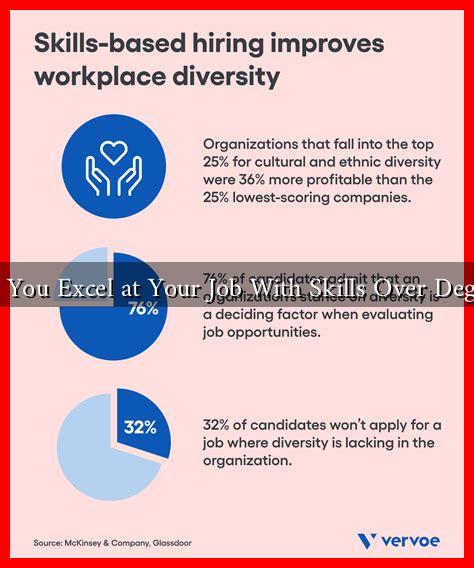-
Table of Contents
Can You Excel at Your Job With Skills Over Degrees?
In today’s rapidly evolving job market, the debate over whether skills or degrees hold more value has gained significant traction. As industries transform and new technologies emerge, employers increasingly prioritize practical skills over formal educational qualifications. This article explores the dynamics of skills versus degrees, providing insights into how individuals can excel in their careers by focusing on skill development.
The Shift in Employer Preferences
Traditionally, a college degree was seen as a ticket to career success. However, recent trends indicate a shift in employer preferences. According to a report by the World Economic Forum, over 50% of employees will need reskilling by 2025 due to technological advancements. This statistic underscores the importance of adaptability and skill acquisition in the modern workforce.
Why Skills Matter More Than Ever
Several factors contribute to the growing emphasis on skills over degrees:
- Technological Advancements: As industries become more tech-driven, specific skills such as coding, data analysis, and digital marketing are in high demand.
- Rapid Industry Changes: The pace of change in many sectors means that knowledge gained in a degree program may quickly become outdated.
- Practical Experience: Employers often value hands-on experience and problem-solving abilities over theoretical knowledge.
- Diversity and Inclusion: Many companies are actively seeking to diversify their workforce, leading to a focus on skills that can be acquired through non-traditional education paths.
Real-World Examples of Skills Over Degrees
Numerous successful individuals and companies exemplify the value of skills over degrees:
- Elon Musk: The CEO of Tesla and SpaceX has often stated that he values skills and problem-solving abilities over formal education. His companies prioritize hiring individuals who can demonstrate their capabilities through practical work.
- Tech Giants: Companies like Google and Apple have shifted their hiring practices to focus on skills rather than degrees. Google, for instance, has implemented a hiring strategy that emphasizes coding tests and practical assessments.
- Case Study – IBM: IBM has launched initiatives to hire individuals based on their skills rather than their educational background. Their “New Collar” jobs focus on skills in technology and innovation, providing opportunities for those without traditional degrees.
The Role of Online Learning and Certifications
The rise of online learning platforms has made it easier than ever for individuals to acquire new skills. Websites like Coursera, Udacity, and LinkedIn Learning offer courses that can enhance employability and provide certifications recognized by employers. According to a survey by LinkedIn, 94% of employees would stay at a company longer if it invested in their career development.
Building a Skills-Based Career Path
To excel in a skills-focused job market, consider the following strategies:
- Identify In-Demand Skills: Research your industry to determine which skills are most sought after by employers.
- Invest in Continuous Learning: Take advantage of online courses, workshops, and seminars to keep your skills up to date.
- Network and Collaborate: Engage with professionals in your field to learn from their experiences and gain insights into skill development.
- Showcase Your Skills: Create a portfolio or personal website to demonstrate your abilities and projects to potential employers.
Conclusion
In conclusion, while degrees can provide foundational knowledge, skills are increasingly becoming the key to career success. The modern job market values adaptability, practical experience, and continuous learning. By focusing on skill development and leveraging online resources, individuals can excel in their careers, regardless of their educational background. As the landscape of work continues to evolve, embracing a skills-first approach will be essential for both job seekers and employers alike.
For more insights on the importance of skills in the workplace, visit Forbes.

